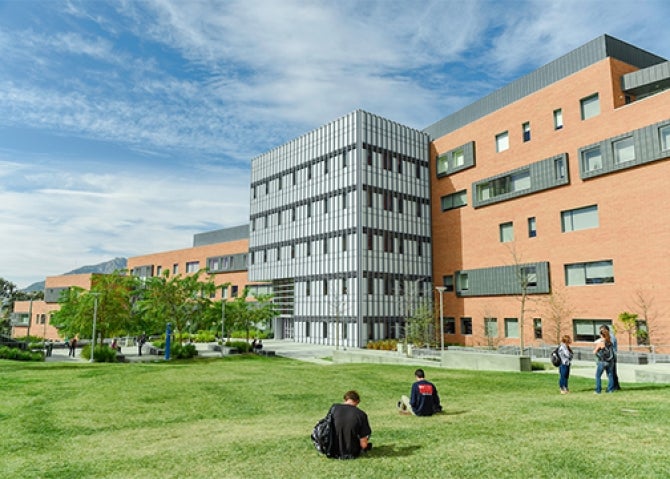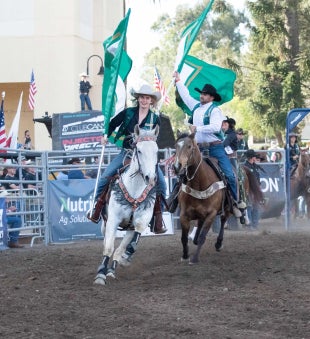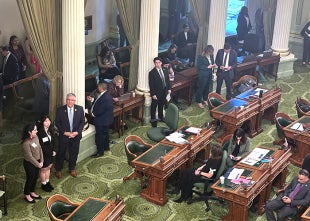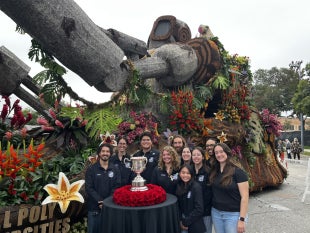Cal Poly Funds 18 Faculty Projects Through Research, Scholarly and Creative Activities Grant Program

Contact: Keegan Koberl
805-458-9302; kkoberl@calpoly.edu
SAN LUIS OBISPO — Cal Poly’s Division of Research announced 18 awards for the 2024-25 cycle of the Research, Scholarly and Creative Activities (RSCA) grant program.
Supported by funds from the California State University (CSU) Chancellor's Office and the Cal Poly Provost's Office, the RSCA grant program is designed to enable faculty to contribute new knowledge through robust programs of scholarship focused on strengthening California socially, culturally and economically. The RSCA program is one mechanism by which Cal Poly supports the teacher-scholar model, in which faculty integrate excellence in teaching with excellence in research, scholarly and creative activities.
“These RSCA grants demonstrate the innovative research of our Cal Poly faculty. Embracing the teacher-scholar model, these projects provide unique opportunities for faculty to collaborate with students,” said Sarah Lester, chair of the Grants Review Committee of the Academic Senate.
The Division of Research received 58 proposals requesting a total of $983,000. Using the criteria outlined in the RSCA Request for Proposals and guided by the review and rankings of the Academic Senate Grants Review Committee, over $310,000 in funds have been awarded to 18 projects.
“Research, scholarly, and creative activities play a vital role in our teacher-scholar approach,” said Dawn Neill, Cal Poly’s interim vice president for research. “The RSCA grant program bolsters Cal Poly's intellectual vibrancy and embodies our Learn by Doing ethos. Cal Poly remains dedicated to supporting faculty in advancing their scholarship, fostering collaborations with colleagues and students, and driving continuous discovery and innovation. Congratulations to the awardees!”
The RSCA program, active at Cal Poly since 2014-15, has provided over $3 million in grants to faculty members over this period.
The 2024-25 awarded projects are:
- “Effects of microplastics on reproduction and development of sea urchins as a model organism,” Nikki Adams (Biological Sciences).
- “How does soil health impact coffee cupping quality?” Nicholas Babin (Natural Resources Management and Environmental Sciences).
- “Evolutionary adaptation and rangewide population genomics of the imperiled Dunes Sagebrush Lizard,” Lauren Chan (Biological Sciences).
- “Building a Learn by Doing User Experience Partnership between Academic Libraries and Technical and Professional Communication at Cal Poly,” Heather Cribbs (Robert E. Kennedy Library), Krista Sarraf (English), Danielle Daugherty (Robert E. Kennedy Library) and Morgan White (English).
- “Challenges in Local Climate Adaptation: Exploring the Impact of Shrimp Aquaculture in Bangladesh,” Nikhil Deb (Social Sciences).
- “Harmonizing Motion and Message: A Unified Framework for Control and Communication in Connected Autonomous Vehicles,” Siavash Farzan and Payam Nayeri (Electrical Engineering).
- “Synergistic Optimization of Aqueous Organic Redox Flow Batteries: Enhancing Grid-Scale Energy Storage Through Comprehensive Catholyte, Anolyte, and Membrane Integration,” Seamus Jones (Materials Engineering).
- “Women in Construction Research Seminar,” Stacy Kolegraff (Construction Management) and Kylie Parrotta (Social Sciences).
- “Student Parent Perspectives on Early Life Adversity Science, Lived-Experience, and Children’s Health,” Martine Lappe (Social Sciences).
- “Development of novel composite flexible electrodes towards wearable supercapacitors,” Leily Majidi (Mechanical Engineering).
- “Belonging Beyond Boundaries: A Multi-Modal Machine Learning Inquiry into Student Well-Being, Professor Mindsets, and Bias in Computing and STEM Education,” Sumona Mukhopadhyay, (Computer Science and Software Engineering), Julie Bettergarcia (Psychology and Child Development) and Zoe Wood (Computer Science and Software Engineering).
- “Statistical methods for environmental genomics,” Trevor Ruiz (Statistics).
- “Expectations for Good Engineers: Impacts of Structural Engineering Culture on Diversity,” Lara K. Schubert (Women's, Gender and Queer Studies).
- “Engaging Architecture: Enhancing and Evaluating Multi-Sensory Experience in Sites of Cultural Heritage with Spatial Computing and Emotion-AI," Jennifer Shields (Architecture) and Javier Gonzalez-Sanchez (Computer Science and Software Engineering).
- “Building Pathways to Computer Science Careers for Latinx Students Through Multilingual Collaborative Block-Based Programming,” Dev Sisodia and Javier Gonzalez-Sanchez (Computer Science and Software Engineering).
- “Homelessness-based Impact Hiring and Consumers Contagion Concerns,” Cindy Wang (Marketing).
- “Tiny Neural Networks for Microcontrollers: with applications to sparse identification of nonlinear dynamics,” Siyuan Xing (Mechanical Engineering).
- “Synergistic Catalysis Enabled Chemical Recycling of Plastic Waste,” Shanju Zhang (Chemistry and Biochemistry).



